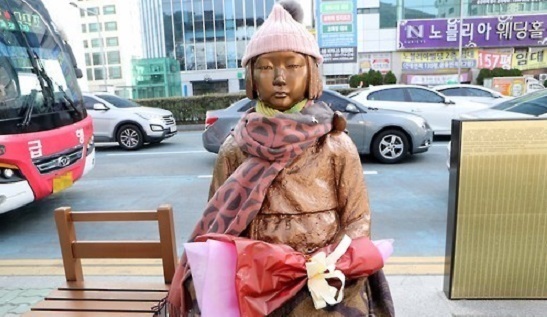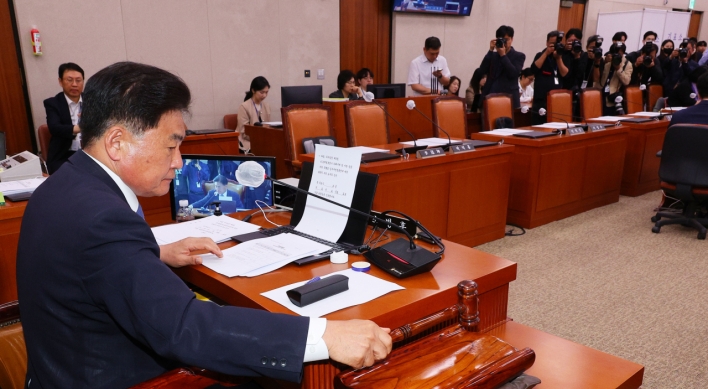Korea-Japan sex slavery deal comes under pressure for revision
By a2017001Published : May 17, 2017 - 14:14
The long-standing dispute over wartime sexual slavery has resurfaced to strain South Korea-Japan relations, as the government change in Seoul and a UN experts panel's recommendation lent momentum for redressing a 2015 deal aimed at resolving one of the trickiest issues between the two nations.
President Moon Jae-in, who took office last Wednesday, called for the renegotiation of the much-criticized agreement during his campaign. In a telephone conversation with Japanese Prime Minister Shinzo Abe last week, Moon made clear that most South Koreans cannot accept it emotionally.
On Friday, the UN Committee Against Torture issued a report calling into question whether the deal was enough to help and support the victims with indelible scars.
It said that the deal should be "modified to ensure that the surviving victims of sexual slavery during World War II are provided with redress, including the right to compensation and rehabilitation and the right to truth, reparation and assurances of non-repetitions."

In December 2015, South Korea and Japan reached the deal to put an end once and for all to the decades-old row over comfort women, a euphemism for those forced into front-line brothels for Japanese troops during the World War II.
Under the deal, Tokyo expressed an apology for its colonial-era atrocities and agreed to launch a foundation dedicated to supporting the surviving victims of sexual slavery. It also promised to contribute 1 billion yen (US$9.97 million) to the foundation launched last year.
The deal, however, ignited a fire storm of protests in Korea with critics doubting the sincerity of Japan's apology, claiming that it was hastily arranged without sufficiently seeking the opinions of victims. They called for its nullification.
The dispute was further compounded as Japan repeatedly hinted that its implementation is closely linked to the removal of a statue installed in front of its embassy in Seoul to symbolize the hardship of women forced into sexual slavery.
Earlier this year, Tokyo brought home its ambassador to Seoul in protest of another similar statue installed late last year before its consulate in the southeastern port city of Busan. He returned to work almost three months later.
South Korea has argued that it has no authority to get the statues removed as they were built by civic groups, though it promised to do what it can to help produce an appropriate solution.
Politicians weighed in on the issue, with major presidential candidates, including Moon, promising to seek to renegotiate the deal.
Seoul has remained cautious for fear the comfort women issue could derail their bilateral ties. The previous Park Geun-hye government was adamant that it would faithfully fulfill what was agreed upon in the deal.
After Moon won last Tuesday's presidential election triggered by Park's ouster over corruption, the government appears to be changing its stance, as is apparent in the foreign ministry's response to the UN panel's report.
"We bear in mind (the UN panel's recommendation)," Cho June-hyuck, foreign ministry spokesman, told a regular press briefing Tuesday. "Relevant ministries and agencies are currently reviewing what was recommended."
The Committee Against Torture, launched in 1988, consists of 10 independent experts tasked with monitoring the implementation of the Convention against Torture to which Japan became a party in 1999.
Japan was quick to rebuff any possible renegotiation, saying that such an agreement made between governments should be respected and fully implemented under any circumstances.
On Monday, Japanese Chief Cabinet Secretary Yoshihide Suga noted that the deal was highly praised by the then UN
Secretary-General Ban Ki-moon, a former South Korean foreign minister, and that the UN recommendation is not legally binding.
With the ever deepening diplomatic friction, experts cautioned against reading too much into the recent UN report as it could "inflate" the expectations of the Korean people at a time where it is hard to see that happen.
Lee Won-deok, a professor at Kookmin University in Seoul, said that a UN panel's recommendation might not reflect the entire opinions of the global community, much less be legally binding. He added that it is unrealistic for Abe to accept such a renegotiation request from Seoul in view of public sentiment there.
"We shouldn't approach this issue as a zero-sum game since nobody will give into the other. This is time for diplomacy to play a role," he said. "Both should try to find common ground that they can accept by maintaining the framework of the deal."
"What lacks the most in the deal, I think, is apology or repentance from Japan that our people could see as genuine and sincere. If Abe provides a sincere apology himself or Japan takes such an emotional step as building a memorial and a monument for the victims, both can find a way to keep the deal and move the ties ahead," he added.
The professor emphasized that both countries should work hard to prevent a single issue, albeit a very important one, from becoming a "black hole" that could render them incapable of seeking bilateral cooperation at all in many other areas down the road. (Yonhap)











![[Kim Seong-kon] Democracy and the future of South Korea](http://res.heraldm.com/phpwas/restmb_idxmake.php?idx=644&simg=/content/image/2024/04/16/20240416050802_0.jpg&u=)





![[KH Explains] Hyundai's full hybrid edge to pay off in slow EV transition](http://res.heraldm.com/phpwas/restmb_idxmake.php?idx=652&simg=/content/image/2024/04/18/20240418050645_0.jpg&u=20240418155304)

![[Today’s K-pop] Zico drops snippet of collaboration with Jennie](http://res.heraldm.com/phpwas/restmb_idxmake.php?idx=642&simg=/content/image/2024/04/18/20240418050702_0.jpg&u=)